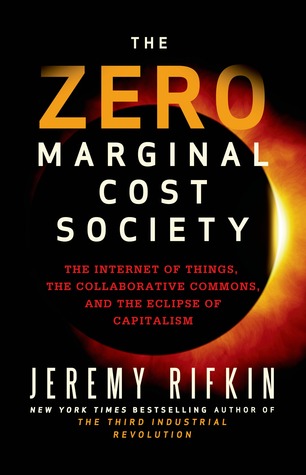 ISBN: 1137278463
ISBN: 1137278463Published: April 1st, 2014
Publisher: Palgrave Macmillan Trade
Read from July 6th to 10th, 2014
Synopsis from Goodreads:
In The Zero Marginal Cost Society, New York Times bestselling author Jeremy Rifkin describes how the emerging Internet of Things is speeding us to an era of nearly free goods and services, precipitating the meteoric rise of a global Collaborative Commons and the eclipse of capitalism.
Rifkin uncovers a paradox at the heart of capitalism that has propelled it to greatness but is now taking it to its death—the inherent entrepreneurial dynamism of competitive markets that drives productivity up and marginal costs down, enabling businesses to reduce the price of their goods and services in order to win over consumers and market share. (Marginal cost is the cost of producing additional units of a good or service, if fixed costs are not counted.) While economists have always welcomed a reduction in marginal cost, they never anticipated the possibility of a technological revolution that might bring marginal costs to near zero, making goods and services priceless, nearly free, and abundant, and no longer subject to market forces.
Now, a formidable new technology infrastructure—the Internet of things (IoT)—is emerging with the potential of pushing large segments of economic life to near zero marginal cost in the years ahead. Rifkin describes how the Communication Internet is converging with a nascent Energy Internet and Logistics Internet to create a new technology platform that connects everything and everyone. Billions of sensors are being attached to natural resources, production lines, the electricity grid, logistics networks, recycling flows, and implanted in homes, offices, stores, vehicles, and even human beings, feeding Big Data into an IoT global neural network. Prosumers can connect to the network and use Big Data, analytics, and algorithms to accelerate efficiency, dramatically increase productivity, and lower the marginal cost of producing and sharing a wide range of products and services to near zero, just like they now do with information goods.
The plummeting of marginal costs is spawning a hybrid economy—part capitalist market and part Collaborative Commons—with far reaching implications for society, according to Rifkin. Hundreds of millions of people are already transferring parts of their economic lives to the global Collaborative Commons. Prosumers are plugging into the fledgling IoT and making and sharing their own information, entertainment, green energy, and 3D-printed products at near zero marginal cost. They are also sharing cars, homes, clothes and other items via social media sites, rentals, redistribution clubs, and cooperatives at low or near zero marginal cost. Students are enrolling in free massive open online courses (MOOCs) that operate at near zero marginal cost. Social entrepreneurs are even bypassing the banking establishment and using crowdfunding to finance startup businesses as well as creating alternative currencies in the fledgling sharing economy. In this new world, social capital is as important as financial capital, access trumps ownership, sustainability supersedes consumerism, cooperation ousts competition, and “exchange value” in the capitalist marketplace is increasingly replaced by “sharable value” on the Collaborative Commons.
Rifkin concludes that capitalism will remain with us, albeit in an increasingly streamlined role, primarily as an aggregator of network services and solutions, allowing it to flourish as a powerful niche player in the coming era. We are, however, says Rifkin, entering a world beyond markets where we are learning how to live together in an increasingly interdependent global Collaborative Commons.
Review:
I recieved this book in a Goodreads First Reads giveaway in exchange for a review. Rifkin has quite a few books, and although I didn't realize this until later, seems to have a pretty strong reputation for writing controversial stuff too. As with all of my reviews, I try to review a book based on the book itself and not whether or not I agree with a book, although that's sure to seep in at least a bit.
I enjoyed this book. I don't necessarily think that Rifkin is right about everything in it, but I do think it raises a lot of interesting questions. Rifkin also does a very good job of presenting his argument in a way that makes it make sense. I'm not really interested in economics at all, but I was interested in this book. Rifkin's writing managed to hold my interest the majority of the time, although I'll also admit that there were parts of the book that I skimmed. I still read far more of it than I would have almost any other book on economics.
There are a lot of good things I took away from this book. It made me think about ways the Internet is changing the economy, and whether or not Rifkin was exactly right, I do think the Internet is changing the economy (as it is changing almost everything else) in a lot of ways. I'm glad there's a book discussing that, and I think it's an interesting topic to explore.
I would recommend this book to anyone who's interested in economics, the Collaborative Commons, or the way the Internet is changing the world. I think it presents a lot of very interesting ideas.

Well a book on economics doesn't exactly scream "read me" does it? LOL, but I'm glad that you found it easier to read than you would have expected from a book on economics and it sounds like it made you think, which is always great. And I do like controversial :)
ReplyDelete